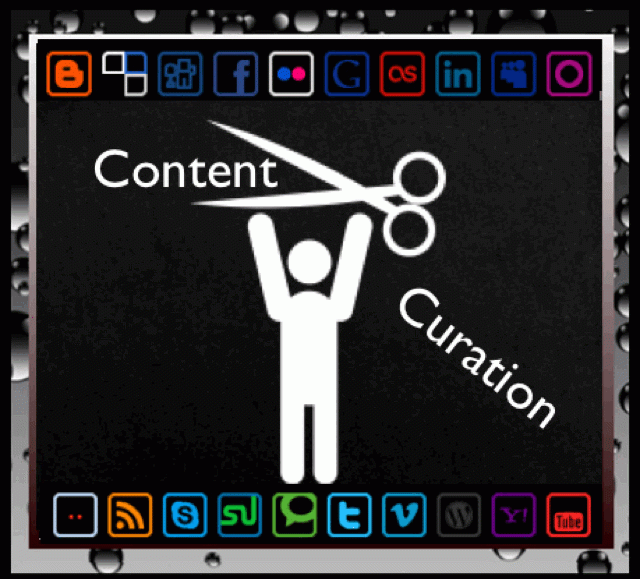Secure your place at the Digiday Publishing Summit in Vail, March 23-25

Curation is a word that gets thrown around a lot in digital media. You could be talking about content curation, a curation platform, news aggregation, social content curation, video curation, The Huffington Post, Business Insider. The list goes on. It’s clear that “curation” has achieved A-list buzzword status over the past few years.
But let’s not forget that the word curation has been around for a long time. Like many terms, the marketing industry has taken it and turned it into something quite different and, arguably, much more annoying. Below is Digiday’s first Buzzword Tracker, which features an overview of the evolution of the word “curation,” from its first use to its current buzzword status.
 ~500 BC: In Ancient Rome, “curatores” were senior civil servants who oversaw various departments of public works that were in charge of building things like roads and aqueducts.
~500 BC: In Ancient Rome, “curatores” were senior civil servants who oversaw various departments of public works that were in charge of building things like roads and aqueducts. Late 14th century: “Curate” used in English language to mean a “spiritual guide.” From the Online Etymology Dictionary: curate (n.) “from M.L. curatus ‘one responsible for the care (of souls),’ from L. curatus, pp. of curare ‘to take care of’ (see cure). Church of England sense of ‘paid deputy priest of a parish’ first recorded 1550s.”
Late 14th century: “Curate” used in English language to mean a “spiritual guide.” From the Online Etymology Dictionary: curate (n.) “from M.L. curatus ‘one responsible for the care (of souls),’ from L. curatus, pp. of curare ‘to take care of’ (see cure). Church of England sense of ‘paid deputy priest of a parish’ first recorded 1550s.”- Late 20th century: “Curator” becomes a term associated with exhibitions and museums, and the title of curator meant someone in charge of a museum, art collections or exhibitions, etc.

- Early 2000s: Blogs are growing in popularity, but are still more like personal diaries.
- 2003: WordPress is founded.
- 2007: Tumblr founded.

- Apr. 2009: Jeff Jarvis writes about the “journalist as curator.”
- Oct. 2009: The New York Times notes appropriation of the word “curate” by creative types—like boutique owners, DJs, bloggers, etc.—to mean having taste, discernment.
- Dec. 2009: Storify founded.
- 2009: Decline of print journalism, people begin to point fingers at bloggers and curation/aggregation of original content.
- May 10, 2010: Fast Company declares content curation is “here to stay.”
- May 2010: Steve Rosenbaum, CEO of Magnify.net, publishes “Curation Nation.” The book gets praise from big names like Morgan Spurlock, Arianna Huffington, Clay Shirky and Terence Kawaja.

- Nov. 22, 2010: Fast Company declares content curation is going to be “HUGE.”
- Nov. 29, 2010: Bob Garfield writes an article for Ad Age on why we live in a “Curation Nation.”
- 2011: Percolate is founded.
- Apr. 26, 2011: Fast Company declares the birth of the “Curation Economy.”
- Mar. 2012: After a fight with the Huffington Post over its aggregation practices, journalist Simon Dumenco forms the Council on Ethical Blogging and Aggregation. That month Maria Popova of Brain Pickings (and self-proclaimed “Interestingness hunter-gatherer obsessed with combinatorial creativity”) and Kelli Anderson release the Curators Code, a site that offers guidelines and specific symbols for proper attribution when curating and aggregating content.

- Feb. 2012: Forbes blogger Kashmir Hill gets flack for summarizing part of a NYT piece in her own post. Ethics of curation once again in question.
- June 2012: Forbes publishes an article on why content curation has gone mainstream.
- July 5, 2012: Wired runs an article on curation and the evolution of the “global brain.”
- July 20, 2012: Forbes runs piece on the future of digital content curation as a business model.
Other Curation Stats:
-Wikipedia entry for “digital curation” was last modified on June 15, 2012.
-Mashable has a topic section that you can follow designated to “Curation.”
-Microsoft Word doesn’t recognize “curating” as a word.
-A search for “curation” on Techcrunch yields 2,090 results.
-Search volume for “content curation” skyrocketed from mid 2010 to 2012. See chart:
More in Media

Media Briefing: As AI search grows, a cottage industry of GEO vendors is booming
A wave of new GEO vendors promises improving visibility in AI-generated search, though some question how effective the services really are.

‘Not a big part of the work’: Meta’s LLM bet has yet to touch its core ads business
Meta knows LLMs could transform its ads business. Getting there is another matter.

How creator talent agencies are evolving into multi-platform operators
The legacy agency model is being re-built from the ground up to better serve the maturing creator economy – here’s what that looks like.





